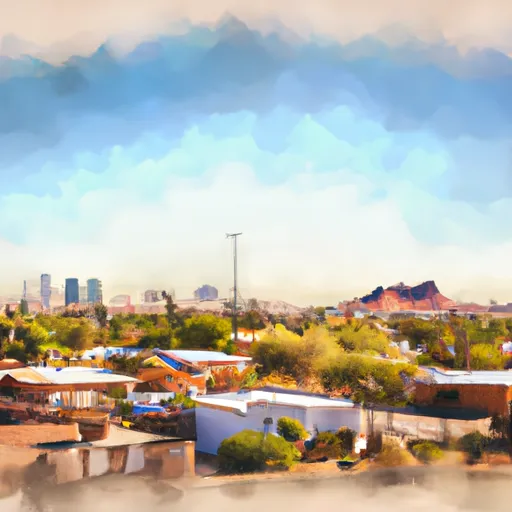-
 Snoflo Premium
Snoflo Premium
Get unlimited access to all our content
With no Ad interruptions! - Start Your Free Trial Login with existing account
Fort-Mcdowell
Eden Index
Climate
7.8
•
Recreation
6.2
•
Community
5.3
•
Safeguard
6.6/10

Fort McDowell is a small unincorporated community located in Maricopa County, Arizona. The climate in Fort McDowell is hot and dry with temperatures ranging from the mid-60s in the winter to the mid-90s in the summer. The area is surrounded by several bodies of water, including the Verde River, Saguaro Lake, and the Salt River. These water sources, along with the surrounding mountains, provide ample opportunities for outdoor recreation such as fishing, boating, hiking, and camping. Additionally, there are several local attractions in the area, such as the Fort McDowell Casino and the Fort McDowell Yavapai Nation Cultural Center. Hydrology constituents in the area include the Salt River Pima-Maricopa Indian Community Water Rights Settlement, which addresses water rights and management in the area.
What is the Eden Index?
The Snoflo Eden Index serves as a comprehensive rating system for regions, evaluating their desirability through a holistic assessment of climate health, outdoor recreation opportunities, and natural disaster risk, acknowledging the profound impact of these factors on livability and well-being.
Climate Health Indicator (CHI): 7.8
Fort-Mcdowell receives approximately
271mm of rain per year,
with humidity levels near 46%
and air temperatures averaging around
22°C.
Fort-Mcdowell has a plant hardyness factor of
9, meaning
plants and agriculture in this region tend to thrive here all year round.
By considering the ideal temperature range, reliable water supplies, clean air, and stable seasonal rain or snowpacks, the Climate Health Indicator (CHI) underscores the significance of a healthy climate as the foundation for quality living.
A healthy climate is paramount for ensuring a high quality of life and livability in a region, fostering both physical well-being and environmental harmony. This can be characterized by ideal temperatures, reliable access to water supplies, clean air, and consistent seasonal rain or snowpacks.
Weather Forecast
Streamflow Conditions
Verde
Area Rivers
Verde
Snowpack Depths
Verde
Reservoir Storage Capacity
Verde
Groundwater Levels
Recreational Opportunity Index (ROI): 6.2
The Recreational Opportunity Index (ROI) recognizes the value of outdoor recreational options, such as parks, hiking trails, camping sites, and fishing spots, while acknowledging that climate plays a pivotal role in ensuring the comfort and consistency of these experiences.
Access to outdoor recreational opportunities, encompassing activities such as parks, hiking, camping, and fishing, is crucial for overall well-being, and the climate plays a pivotal role in enabling and enhancing these experiences, ensuring that individuals can engage in nature-based activities comfortably and consistently.
Camping Areas
| Campground | Campsites | Reservations | Toilets | Showers | Elevation |
|---|---|---|---|---|---|
| McDowell Mountain | 76 | 1,875 ft | |||
| Coon Bluff | 5 | 1,352 ft | |||
| Regional Park - Usery Mt RA | 73 | 1,991 ft | |||
| Lost Dutchman State Park | 70 | 2,068 ft | |||
| Phon D Sutton | 15 | 1,347 ft | |||
| Bartlett Flat | None | 1,886 ft | |||
| Usery Mountain | 73 | 1,988 ft | |||
| Box Bar | 20 | 1,519 ft |
Nearby Fishing
Catastrophe Safeguard Index (CSI):
The Catastrophe Safeguard Index (CSI) recognizes that natural disaster risk, encompassing floods, fires, hurricanes, and tornadoes, can drastically affect safety and the overall appeal of an area.
The level of natural disaster risk in a region significantly affects safety and the overall livability, with climate change amplifying these risks by potentially increasing the frequency and intensity of events like floods, fires, hurricanes, and tornadoes, thereby posing substantial challenges to community resilience and well-being.
Community Resilience Indicator (CRI): 5.3
The Community Resilience Indicator (CRI) recognizes that education, healthcare, and socioeconomics are crucial to the well-being of a region. The CRI acknowledges the profound impact of these elements on residents' overall quality of life. By evaluating educational resources, healthcare accessibility, and economic inclusivity, the index captures the essential aspects that contribute to a thriving community, fostering resident satisfaction, equity, and social cohesion.

